jim wallis

EARLIER THIS YEAR I heard Rev. William Barber of the Moral Mondays movement in North Carolina use the phrase “Mr. James Crow, Esq.”
Since hearing the phrase, I have been reflecting on the revised and updated name for Jim Crow, the comprehensive and brutal system of racial segregation, discrimination, and terrorist violence against black lives and bodies—explicit in the U.S. South, and often implicit in the North, throughout the 20th century.
I have been thinking about this new and more-sophisticated Mr. James Crow, wearing a white shirt and a tie instead of a white sheet and a hood and inhabiting the back rooms in state legislatures and corporate offices instead of rural backwoods lynching sites.
I’ve also been thinking about Mr. Crow’s strategy for the 2016 election and the years ahead.
Mr. James Crow’s biggest concern now is the transformational demographic shifts occurring in the United States, which by 2040 or so will see a significant milestone: For the first time, the U.S. will no longer be a white-majority nation and, instead, will be made up of a majority of minorities. That’s one of the most important facts in American political life today. This fundamental demographic shift in racial and cultural identity is underneath almost everything in U.S. politics—including the presidential election.
So with a suit instead of a sheet, how does Mr. James Crow, Esq., enact his strategy? And what are the servants of Mr. Crow saying to one another?
THIS NEW VERSION of Jim Crow has a clear, systematic strategy to protect white supremacy and promote racial segregation, discrimination, and even violence. He knows that even he, with all his power, can’t prevent the racial demographics of America from evolving. But he thinks he can obstruct and delay the changes that new racial demographics will bring to American life and politics. In apartheid South Africa, we saw that even when a racial group is in the minority, it can wield the power to oppress other races and protect its own supremacy.
Mr. James Crow’s five-part strategy includes:
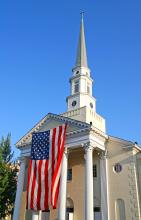
“WE CAN'T LET our status as nonprofits turn us into non-prophets.” My old friend Rev. Timothy McDonald III, senior pastor of First Iconium Baptist Church, said that at a town hall meeting on racism that we had in Atlanta’s Ebenezer Baptist Church last spring, on the anniversary of the murder of Martin Luther King Jr.
In McDonald’s “prophetic” way, he was pointing to a real dilemma that many of us as church leaders are having with this election. Namely, how do we speak to the clear Christian issues involved in this election without violating our status as a nonprofit organization? (Under IRS regulations, so-called 501(c)(3) organizations such as ours are prohibited from participating in political campaigns.) How do we raise up a morally independent stance, as opposed to a politically partisan position?
Sojourners has always sought to change the conversation of election debates by lifting up the voices and interests of those outside of traditional political discourse: the most vulnerable, who are often of least interest to those looking for votes or campaign contributions. We have never endorsed a candidate for president but have always raised the moral issues of poverty, peace, justice, and the dignity of every life during election campaigns and asked Christians to vote according to those values.
I spent three days in early September with three different groups of faith leaders who were trying to bring their faith to bear in this election. These meetings, which featured leaders from many faith traditions, ethnicities, and theological backgrounds, focused on how to respond to the divisive and dangerous racial rhetoric in this presidential election campaign. We sought to discern how to remain independent of partisan political causes, faithful to the transcendent Christian values that are clearly at stake in this election, respectful of Christians who are led to different voting preferences in every election (which is a healthy thing), and civil in our own public discourse in an election environment that seems to have lost all civility.

THOSE BEARING witness at Standing Rock have become some of the most important, and most prophetic, leaders protecting God’s earth in America today—especially given the threat to our environment that Donald Trump represents.
There is no better example of what the struggle to protect God’s creation looks like now, and may look like in the future, than the “water protectors” at Standing Rock, who have put their bodies on the line for months to stop the Dakota Access pipeline from being built on sacred tribal lands and endangering the water supply of Indigenous people. Native Americans have been joined by people of every color and creed, including clergy (see “A Chorus of Resistance” in this issue) and military veterans, to prevent the construction from moving forward, despite brutal attacks from private security forces and state law enforcement.
The decision by the Army Corp of Engineers in early December to deny an easement for the pipeline route across Lake Oahe on the Missouri River, adjacent to the Standing Rock reservation, will temporarily halt the construction. But the head of the company building the pipeline has been a major contributor to Trump’s campaign, and with perhaps the most anti-environment president in memory about to enter office, the struggle is far from over.
“It is a temporary victory,” Denise McKay, a member of the Standing Rock Sioux told the Washington Post. “We’ve got to stay put and stay united.” Her daughter, Chelsea Summers, added, “everybody is still here for the long haul.”
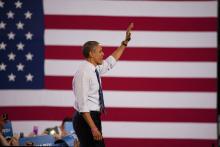
PRESIDENT BARACK OBAMA has only been out of office for a few weeks, but his legacy is secure in ways that are critical to our national identity—and quite separate from his policy successes and failures.
One lens through which we can understand Obama’s relevance and lasting historical legacy is found, surprisingly, in the book of Genesis. Genesis 1:26-27 gives us the first biblical description of human origin: “Then God said, ‘Let us make humankind in our image, to be like us. ... Humankind was created as God’s reflection: in the divine image God created them; female and male, God made them.’”
This text is foundational to how we understand God’s purpose for the world and for human beings. Perhaps most important, it establishes the foundational value of every human as being made in the image of God ( imago dei).
This biblical revelation—and America’s racial history—is why the election of Barack Obama as president in 2008 is of such lasting importance. The United States was founded on the original sin of white supremacy, which declared that some people were less human than others; the nation was built on the kidnapping and enslavement of Africans and the displacement and eradication of Native Americans. In the process, the founders of our nation cast aside the notion of imago dei. The Constitution enshrined the notion that African slaves could be considered three-fifths of a person for the purposes of congressional representation (and Native Americans counted not at all).
Choosing an African-American man for the highest office in our nation—making him the most powerful person in the world for eight years—was and is a fundamental blow to white supremacy. The Obama presidency marked a historic era in the longstanding and ongoing movement to undo white supremacy and privilege.
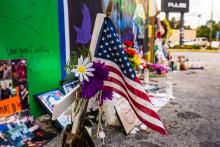
Piety’s Dark Side
Love the Sinner is a short documentary narrated by queer filmmaker Jessica Devaney, who grew up in a conservative evangelical church. In the wake of the 2016 Pulse nightclub shooting, she takes a hard look at the connection between Christianity and homophobia. lovethesinnerfilm.com
Crisis and Conscience
Simone Campbell, Kelly Brown Douglas, Jacqueline M. Hildago, George “Tink” Tinker, Kwok Pui-lan, Jim Wallis, and others write about the “confessional crisis” of our political era and possible faithful responses in Faith and Resistance in the Age of Trump. Edited by Miguel A. De La Torre. Orbis
A Lifetime Adventure
Calling All Years Good: Christian Vocation throughout Life’s Seasons explores calling as something we wrestle with not just as young adults but “from infancy to old age,” combining social science insights with practical theology. Edited by Kathleen A. Cahalan and Bonnie J. Miller-McLemore. Eerdmans
Hard-Won Wisdom
John M. Perkins, co-founder of the Christian Community Development Association, has spent decades working for a gospel that is inseparable from racial and economic justice. In the memoir Dream With Me: Race, Love, and the Struggle We Must Win, he reminds us, “It all comes down to love.” Baker Books

“Certainly, ending racism might seem like an aspiration but, like the very first disciples, we followers of Jesus are called to bear witness to something that the world cannot yet believe is possible,” said the Rev. Sharon Watkins, director of the NCC’s Truth and Racial Justice Initiative and the president of the Christian Church (Disciples of Christ). “We are called to say this can happen. Racism can end.”

I believe that there are moral issues, values choices, and faith matters that lie just beneath the political headlines. Conversations around those — leading to action — can get us further than our political debates. I also believe there are two great hungers in our world today: the hunger for spirituality and the hunger for justice, and the connection between the two is absolutely vital now.
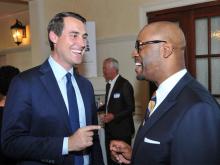
King is no latecomer on this issue. His views and his deep commitment to the LGBTQ community were shaped by his gay older brother’s suicide in the 1990s, an event that shook his family.
King’s sentiments were not unique, even for straight white believers like himself. What is unique is that they came from a candidate for governor of Florida who is running as both an evangelical Christian and a progressive Democrat.
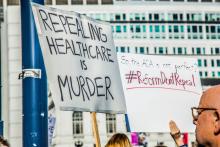
In essence, we have struggled to understand the work and responsibility of Christian compassion in issues of healthcare and policy. Should this responsibility be shared by all and secured by the government, or should it primarily be the domain of people of faith and those moved by a higher calling to mercy and healing? With the new GOP Health Care Bill, and the ongoing debates about healthcare in America, Christians across the aisle struggle to evaluate how well we are doing at caring for the disenfranchised and the sick.
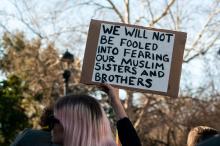
Dozens of what are being billed as “anti-Sharia marches” are scheduled for this weekend in 28 cities in 20 states nationwide. The so-called March Against Sharia is organized by ACT for America, a grassroots organization that claims to “preserve American culture and keep this nation safe.” And religious groups across the country are speaking out.
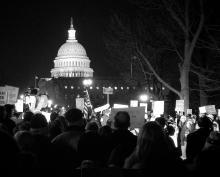
Social and economic inequities are not just personal attitudes — they are the result of structural problems prevalent in many sectors of society and government. In the face of this reality, the federal government can be a force for good, attempting to correct its own past complicity and working to prevent future discriminatory behavior by businesses, schools, contractors, local police departments, and more. But this administration’s disregard for civil rights in the federal agencies it administers leads to an inescapable conclusion.

President Donald Trump's executive order on Thursday making it easier for churches to dabble in politics kept faith with his promise to evangelical Christians who helped him win the White House, but could end up benefiting his opponents as well.
...
Sojourners, a Washington-based progressive Christian network that advocates for immigrants and the poor, also believes more of its members will now feel free to speak out against Trump's policies.

Editor-Publisher David Wilson's Observations; Interview with activist and Sojourners founder Jim Wallis; and environmentalist and broadcaster David Suzuki reads a letter to his grandchildren.

FOR IMMEDIATE RELEASE
Contact: Michael Mershon | mmershon@sojo.net
Jazmine Steele | jsteele@sojo.net
“Falwell’s ‘dream president’ is a nightmare for Christians of color”
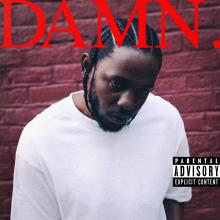
For what the singer/songwriter/music producer Pharrell said two years ago about Kendrick Lamar is absolutely true. Kendrick Lamar is the Bob Dylan of his generation, an American storyteller on the same plane as Toni Morrison, Eugene O’Neill, Pearl S. Buck, and other U.S. Nobel Prize in Literature laureates. Why this statement may seem overblown is because of highbrow bias against hip-hop, which is to say bias against black language, black storytellers, black people. But, to quote Chuck D, the leader of the rap group Public Enemy, hip-hop is “CNN for black people.” And Lamar is the best reporter in the business.

Jim Wallis and I were talking about baseball recently. He claimed that baseball is great because at the start of every season, 10 to 15 teams genuinely believe in their chances of advancing to the World Series. How does baseball do that? How does the league ensure strong competition and parity?

FOR IMMEDIATE RELEASE
Contact: Michael Mershon, Director of Advocacy and Communications
Phone: 202-745-4654
Email: mmershon@sojo.net
March 29, 2017
Today, a diverse group of Christian leaders held a press conference and prayer vigil on Capitol Hill to protest proposed legislation that would disproportionally harm poor and vulnerable people. The leaders are members of the Circle of Protection, a broad coalition from all the families of U.S. Christianity who have come together around the biblical mandate to protect poor people
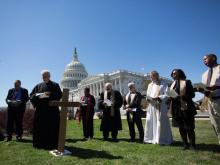
With ashes on their foreheads, sackcloth draped around their necks, and the U.S. Capitol as a backdrop, Christians leaders used the words “evil” and “immoral” to describe the federal budget cuts President Trump has proposed and many Republican lawmakers favor.
“It is a time for lamentation,” said the Rev. David Beckmann, explaining the symbols of grief the clergy brought to Capitol Hill on March 29.

(RNS) Dozens of conservative evangelicals and Catholics have signed an open letter urging their progressive counterparts to “repent of their work that often advances a destructive liberal political agenda.”
The letter, posted online six weeks before Election Day by an alliance called the American Association of Evangelicals, includes criticism of Democratic presidential candidate Hillary Clinton.

On Monday, Sept. 12, Rev. Dr. Jim Wallis opened Calvin’s Center for Faith & Writing fall 2016 series with a speech about his new book, “America’s Original Sin: Racism, White Privilege, and the Bridge to a New America.” The bestselling author, activist, preacher and theologian drew a large crowd to the CFAC. All seats were full, and some visitors had to park in overflow lots near the Seminary and science building.